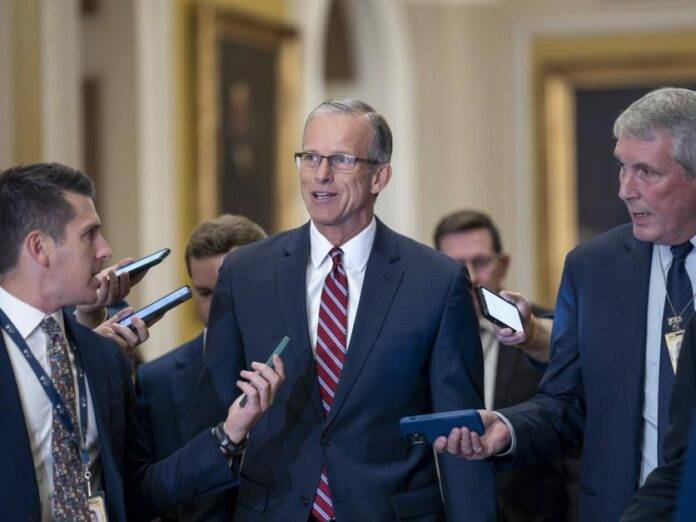The Senate made significant progress early Saturday by advancing a budget framework for comprehensive tax and spending cuts. However, this advancement came after rejecting several Democratic amendments related to tariffs, USDA payments, rural hospitals, and the Supplemental Nutrition Assistance Program.
The Senate voted 51-48 to adopt the fiscal 2025 budget resolution, with two Republicans, Rand Paul of Kentucky and Susan Collins of Maine, voting against it. The resolution now heads back to the House, where it is met with resistance from budget hawks who may have concerns about the funding mechanisms for extending tax cuts. Approval of the budget resolution in the House would enable Republicans to utilize the budget reconciliation process to implement President Donald Trump’s legislative priorities, which include tax and spending cuts, as well as targeted spending increases for border security and the military.
House Budget Committee Chairman Jodey Arrington, R-Texas, expressed disappointment with the budget resolution, labeling it as “unserious.” He criticized the resolution for creating $5.8 trillion in new costs with only $4 billion in enforceable cuts, which he deemed insufficient.
The resolution defers critical decisions regarding the scope of spending cuts and the inclusion of farm bill programs in reconciliation to a later date. It mandates the House Agriculture Committee to identify $230 billion in spending cuts, while the Senate Agriculture Committee is tasked with finding $1 billion in reductions. The chairs of these committees anticipate the final cut in the reconciliation bill to fall somewhere in between. Discussions are ongoing about incorporating increased reference prices for the Price Loss Coverage program and other enhancements for commodity programs and crop insurance in reconciliation.
The resolution adopts a current policy baseline approach to funding extensions to expiring provisions of the 2017 Tax Cuts and Jobs Act. This approach assumes no additional cost in extending these provisions.
Democratic amendments aimed to force Republicans to take a stance on various issues. Senate Minority Leader Chuck Schumer brought forth a measure to reverse tariffs that have increased costs on groceries and common goods since Trump’s inauguration. However, the amendment was rejected along party lines.
An amendment offered by Sen. Dan Sullivan, R-Alaska, to protect Medicare and Medicaid was adopted. Nevertheless, multiple other Democrat-backed amendments seeking to shield these programs from cuts through reconciliation were rejected. For instance, an amendment from Sen. Jack Reed, D-R.I., aimed at preventing reductions in Medicaid enrollment or benefits was turned down by Republicans.
Sen. Tammy Baldwin, D-Wis., proposed an amendment addressing potential Medicaid cuts’ impact on rural hospitals, which failed to pass. Republicans emphasized that reforms to Medicaid or Medicare would not affect benefits, although Democrats raised concerns about the risk of cuts to Medicaid, citing the House Energy and Commerce Committee’s required $880 billion cut.
The Senate also rejected amendments related to the House Agriculture Committee’s $230 billion spending cut instruction and prohibiting USDA from withholding funds through farmer contracts. Senate Agriculture Committee Chairman John Boozman indicated that the latter amendment was unnecessary due to the new administration releasing funds after review.
In conclusion, the Senate’s advancement of the budget framework sets the stage for significant legislative changes in tax and spending policy. The rejection of Democratic amendments underscores the continued partisan divide on key issues, while discussions about the specifics of spending cuts and program inclusions in reconciliation continue to evolve. For more updates and news, visit Agri-Pulse.com.




